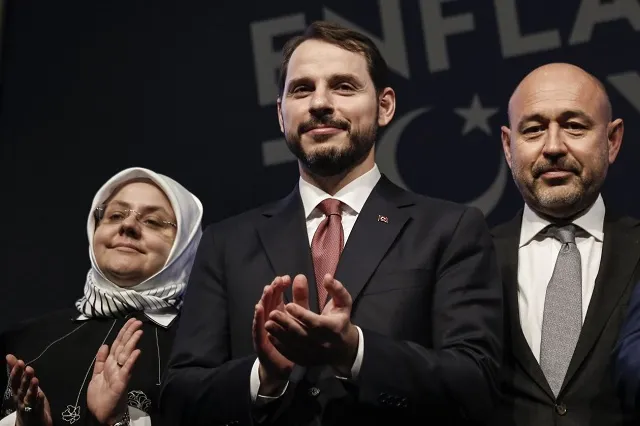Chính phủ Thổ Nhĩ Kỳ vừa tiết lộ các biện pháp nhắm đến kéo giảm tình trạng lạm phát đang ở mức 2 chữ số, đang làm xói mòn niềm tin của giới đầu tư và góp phần vào việc làm sụt giảm giá trị đồng tiền nước này trong năm 2018.

Bộ trưởng Tài chính Berat Albayrak (chính giữa). Ảnh: Bloomberg
Theo lời Bộ trưởng Tài chính Berat Albayrak hôm 9/10, chuỗi biện pháp này được chính phủ hy vọng kiềm chế được chỉ số lạm phát đang ở mức 25% hồi tháng 9, là con số cao nhất trong vòng 15 năm nay của Thổ Nhĩ Kỳ.
Mối lo về lạm phát cao và khoản nợ đầu tư lún sâu kéo dài đã đẩy đồng lira mất giá gần 40% so với đồng đôla Mỹ trong năm nay.
Với sự thôi thúc từ chính phủ, nhiều doanh nghiệp nước này đã đồng ý cắt giảm ít nhất 10% giá thành các sản phẩm tiêu dùng, kể cả các mặt hàng nằm trong rổ mặt hàng dùng để tính toán lạm phát. Việc cắt giảm này được thực hiện một cách tình nguyện.
Sự kết hợp giữa một đồng lira yếu và giá dầu thế giới tăng đang là mối lo ngại lớn của Thổ Nhĩ Kỳ, là nước nhập khẩu nhiên liệu lớn.
Cùng với đó, các ngân hàng cũng sẽ giảm 10% cho các khoản vay lãi suất cao có thời hạn vay từ sau ngày 1/8.
Chính phủ Thổ Nhĩ Kỳ đã có dự báo tính đến cuối năm 2018 chỉ số lạm phát năm sẽ là khoảng 20.8%, và là 15.9% cho năm tiếp theo dựa trên kế hoạch trung hạn mà Bộ Tài chính trình bày hồi tháng 9. Chính phủ sẽ nỗ lực hạ nhiệt nền kinh tế đang bên bờ vực đổ vỡ.
Quỹ Tiền tệ Quốc tế (IMF) dự đoán tốc độ tăng trưởng kinh tế của Thổ Nhĩ Kỳ chỉ vào khoảng 0.4% cho năm 2019, giảm mạnh so với con số 7.4% của năm 2017. Thổ Nhĩ Kỳ cũng từng là nền kinh tế tăng trưởng nhanh nhất nhóm G20 năm 2017.
Giới đầu tư đang tiếp tục lo ngại rằng TT Erdogan sẽ giữ chính sách hiện tại bất chấp lạm phát tăng cao và đồng lira ngày một mất giá.
Turkey Reveals Plans to Tame Inflation
(The Wall Street Journal) - The Turkish government unveiled measures aimed at reining in double-digit inflation that has helped erode investor confidence in the country and contributed to a sharp depreciation of the currency this year.
Turkish Finance Minister Berat Albayrak presented Tuesday a series of measures the government hopes will bring down inflation, which stood at nearly 25% in September, compared with just under 18% for the month before. The September inflation figure was the highest in Turkey in 15 years.
Concerns over high inflation and the sustainability of a debt-fueled investment binge have pushed the Turkish lira down by nearly 40% against the dollar so far this year.
Mr. Albayrak said that, at the government’s urging, many Turkish businesses have agreed to cut prices by at least 10% on consumer goods that are included in the basket of items used to calculate inflation. Businesses would apply any price cuts voluntarily.
Mr. Albayrak, who is the son-in-law of President Recep Tayyip Erdogan, also said that the government will freeze prices for natural gas and electricity by the end of the year. The combination of a weakened lira and rising oil prices globally has been especially painful for Turkey, which imports most of its energy.
Finally, Mr. Albayrak said banks will offer a 10% discount on high-interest loans taken after Aug. 1. No further details were available as to how the discounts would be applied.
The government predicts year-over-year inflation to ease to 20.8% by the end of 2018, and to 15.9% next year under the country’s midterm economic plan announced by Mr. Albayrak last month. The government is trying to cool down the Turkish economy, which has seen debt-fueled growth in recent years, without provoking a crash.
The International Monetary Fund projects Turkey’s economy to expand just 0.4% next year, sharply down from 7.4% last year. Turkey was the fastest-growing economy in the Group of 20 last year. Turkey’s economy grew by 5.2% in the second quarter and the government expects the economy to expand by 3.8% this year.
There have been concerns on the part of investors that Mr. Erdogan wants to keep credit flowing and growth high, despite high inflation and a depreciation of the lira.
